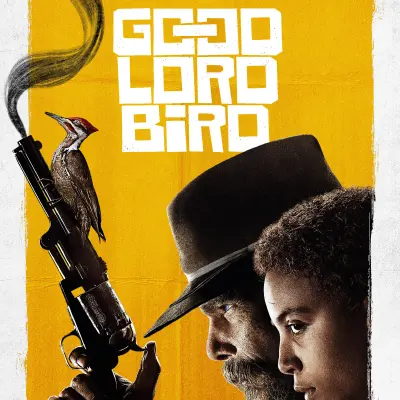Showtime's Ethan Hawke-led The Good Lord Bird is refreshingly quirky for a historical series
-

"Too often, period pieces about the making of America treat the past with undue dignity, turning the raucousness and rambunctiousness of a two-and-a-quarter-century pageant of personalities into a chamber piece," says Daniel D'Addario of the seven-episode Showtime period drama based on James McBride's 2013 book. "American history is serious, sure, but it’s also giddy and strange, and too few entertainments treat it that way. It’s perhaps likely that the character of John Brown — the abolitionist who believed himself possessed by the spirit of the Lord and whose 1859 raid on Harpers Ferry may just have kicked off the Civil War — would tend to resist this sort of false gravity: His mission, for all its consequence and seriousness of purpose, was also fueled by a particularly American mania. But it’s refreshing all the same that The Good Lord Bird, Showtime’s new limited series about Brown and his mission, percolates with quirky and strange energy, overflowing with its sense of America as a place defined by its oddity. Ethan Hawke, who executive produces the series and co-wrote the first episode with showrunner Mark Richard, here plays Brown, a man whom we see early on foaming and spitting with his passion for freeing slaves...Rage and rhetoric are one outlet for his holy and righteous mission; another one is compassion, which he shows to a teenage freed slave named Onion (Joshua Caleb Johnson). As in James McBride’s 2013 novel, on which the series is based, see Brown through Onion’s eyes. it’s a smart way to situate a man who is both merciful and terrifying: Brown’s mercurial nature doesn’t always have to make sense when he’s ebbing in and out of Onion’s view. His bizarreness is the point."
ALSO:
- The Good Lord Bird is a wickedly funny take on an enigmatic man: "Oddly, The Good Lord Bird is a hilarious series," says Robert Daniels, adding: "These moments of self-awareness help the narrative remain on track. Because if only Southerners were lampooned The Good Lord Bird would quickly lose any entertainment value. For instance, when Brown goes on a speaking tour to raise money for his bloody campaign, Onion immediately notices that the only Black person there to see the abolitionist speak is a servant working the event. She comes to notice that the only person not allowed to talk about the liberation of Black folks are Black people. The show is also aware of falling into a white savior narrative. In fact, you might call John Brown the original white savior. The infamous abolitionist routinely grapples with his blindspots."
- Ethan Hawke's fierce turn drives an adaptation that captures much of the novel's comic tone: "Hawke's John Brown is a crescendoing turn, a scenery-devouring blend of crazy-eyed, spittle-flying excess spiked with silent, poignant grace notes of sincerity — the sort of work that requires an actor's confidence and comfort inhabiting both extremes," says Daniel Fienberg. "This John Brown is a man full of sound and fury, but despite a long-winded bluster mocked by all around him — to think the show is unaware of Brown's frequent ridiculousness would be wrong — his mission signifies much."
- Hawke delivers an Emmy-worthy performance: "Barn-burning, spittle-slinging Hawke—who is somewhere between his desperate, radical turn in First Reformed and his confident cowboy in The Magnificent Seven—runs the already stylish limited series," says Jacob Oller. "He blows through scenes like a cannon shot; he’s a fury of sound and saliva, crafting warm charisma through pure power, speed, and volume. Single-minded and ferocious as he seeks justice, it sure is satisfying to watch Brown obliterate some slavers just as Hawke obliterates his own vocal cords. Give this man his Emmy."
- How The Good Lord Bird created its "Old West-looking" feel
- Meet Joshua Caleb Johnson, Hawke's 15-year-old co-star: "What really jumped out to me about Onion was going through all this, having to really take care of himself, and figure out the ways of becoming a man, he truly found himself," says Johnson. "And I could relate to Onion in a lot of ways. Being light-skinned, you don't really fit into a category; you don't fit with white people (or) with darker-skinned Black people."
- How Ethan Hawke learned to play funny for The Good Lord Bird: "Human hypocrisy is funny," he says. "It’s funny to see a guy loading his pistols quoting Jesus of Nazareth. Human beings, people who think they’re racists and then fall in love with a black person — it’s funny. Steve Zahn’s hysterical in the show. The most difficult aspect of the production was finding this tone that McBride strikes, that’s absolutely bonkers, and yet has all this emotion in it. If you tilt too far to the bonkers, it stops having heart. But if you lean too much into the heart, it’s too painful. So finding that weird, strange… it’s a little bit Mark Twain, it’s a little bit Coen brothers, it’s a little bit Redd Foxx. The key was not to play John Brown as he was, but John Brown the way James McBride imagined him."
TOPICS: The Good Lord Bird, Showtime, Ethan Hawke, James McBride
More The Good Lord Bird on Primetimer:- Ethan Hawke: Oscar Isaac asked me to join Moon Knight at a coffee shop after watching The Good Lord Bird
- The Good Lord Bird and Unorthodox win Peabody Awards
- Authors are writing for TV now more than ever
- Daveed Diggs has been very busy, from Snowpiercer to Blindspotting to Central Park and The Good Lord Bird
